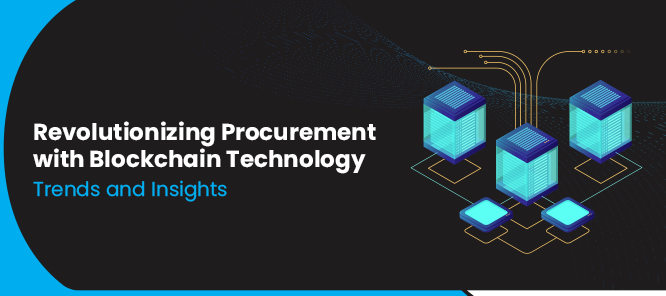
January 20, 2025
Revolutionizing Procurement with Blockchain Technology: Trends and Insights
In recent years, blockchain technology has become a game-changer in many industries. The way companies handle suppliers, contracts, and payments is being transformed by blockchain, offering new levels of clarity, speed, and trust.
In this blog, we’ll look at how blockchain is changing procurement, discuss the latest trends and reports, and share real-life examples of its impact.
The Blockchain Revolution in Procurement
Procurement is a key part of any business, but it often struggles with problems like supply chain issues, fraud, and slow processes. Blockchain helps solve these problems by using a secure, unchangeable system that records every transaction and interaction.
Features like transparency, traceability, and security make blockchain a powerful tool for procurement.
According to a report by Deloitte, 55% of supply chain leaders believe blockchain will be a major disruptor in the next five years, and over 30% of organizations have already started experimenting with blockchain in procurement processes.
Current Trends in Blockchain and Procurement
1. Supply Chain Traceability
Blockchain allows us for end-to-end visibility in supply chains and organizations can trace raw materials, components, and finished goods. This trend is especially important in industries such as food and beverages, pharmaceuticals, and Automobile, where provenance and authenticity are critical.
2.
Smart Contracts
Smart contracts—self-executing contracts with
predefined rules—are becoming increasingly popular in procurement. They automate
purchase orders, payments and compliance checks, reducing manual errors and
delays.
3. Struggle with Procurement Fraud
Procurement fraud, including counterfeit goods and fake invoices, costs businesses billions of dollars each year. Blockchain's immutable ledger ensures that every transaction is recorded and verified, making fraud virtually impossible.
4.
Decentralized Procurement Networks
Blockchain enables decentralized procurement
networks where buyers and suppliers interact directly without intermediaries.
This reduces costs and accelerates procurement cycles.
Blockchain Procurement Reports and Statistics
· Market Growth: The global blockchain in supply chain market size is expected to grow from $315 million in 2023 to $3.2 billion by 2030, with a CAGR of 38.4%. Source: Markets and Markets
· Adoption Rates: A 2024 PwC survey reveals that 40% of procurement leaders are prioritizing blockchain implementation to enhance supplier collaboration and data accuracy.
· Cost Savings: Blockchain can reduce procurement-related costs by up to 30%, primarily through fraud prevention, process automation, and improved data accuracy. Source: Capgemini
Challenges in the Blockchain Procurement Process
While the benefits of blockchain are significant, its adoption in procurement is not without challenges:
High Implementation Costs: Deploying blockchain technology requires significant investment in infrastructure and training.
Interoperability Issues: Ensuring compatibility with existing procurement systems is a hurdle.
Data Privacy Concerns: Though blockchain is transparent, data security and GDPR compliance remain issues for organizations.
Scalability: The blockchain networks are confronted with difficulties in managing large-scale procurement operations.
Future of Blockchain Technology in Procurement
1.
Blockchain-as-a-Service (BaaS)
Platforms offered by some large solution-based
companies through BaaS enable companies to utilize blockchain with prepared
solutions that could be applied for procurement.
2. AI and Blockchain Integration
Combining AI with blockchain is one revolutionary feature that will transform the procurement function. AI will process blockchain data, predict demand, optimize supplier selection, and identify risks.
3.
Wider Adoption in Public Procurement
Governments worldwide are exploring blockchain for
public procurement to ensure transparency and reduce corruption. For instance,
the Government of India’s “GeM” platform is piloting blockchain for vendor
management.
4.
Tokenization of Procurement Assets
Tokenization—the process of converting physical
assets into digital tokens on a blockchain—is expected to simplify procurement
of high-value goods and equipment.
Conclusion
Blockchain technology is no longer a futuristic idea; it is dynamically transforming the procurement sector. From increasing supply chain transparency to automating contracts and combating fraud, the blockchain is bringing new ideas and efficiency to the procurement process.
As a result, many organizations have started adopting the blockchain, and they are finding that blockchain is expensive and difficult to integrate with their current process. However, by implementing blockchain in their current procurement process, businesses can make their operations more efficient, build trust and create transparent and sustainable supply chains.
The future of procurement and blockchain is interconnected, and it is making way for secure and automated contracts, and completely transparent supply chains. If businesses are willing to adopt this change, then the opportunities are endless.Smart Solutions for Smart Procurement
Get in touch with C1 Global to get all the details on our best-in-class offerings or to schedule a demo.
0 Comments:
Leave a Reply